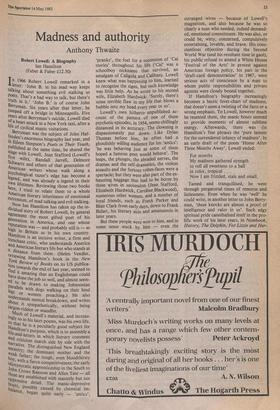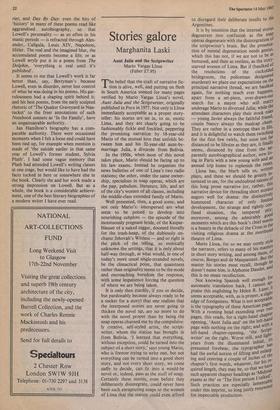Madness and authority
Anthony Thwaite
Robert Lowell: A Biography Ian Hamilton (Faber & Faber £12.50)
Irk 1966 Robert Lowell remarked in a letter: 'John B. in his mad way keeps talking about something evil stalking us
Poets. That's a bad way to talk, but there's truth in it.' john B.' is of course John Berryman. Six years after that letter, he Jumped off a bridge in Minneapolis. Five Years after Berryman's suicide, Lowell died of a heart attack in a New York taxi, after a life of cyclical manic visitations.
Berryman was the subject of John Haf- fenden's enormous biography last year, and in Eileen Simpson's Poets in Their Youth, Published at the same time, he shared the stage with Lowell, Jean Stafford (Lowell's first wife), Randall Jarrell, Delmore Schwartz and others of that generation of American writers whose walk along a Psychological razor's edge has become a legend, and was already a legend in their OW n lifetimes. Reviewing those two books here, I tried to relate them to a whole American literary inheritance of emotional extremism, of mad talking and evil stalking. Now Ian Hamilton has taken up the in- dividual story of Robert Lowell, by general agreement the most gifted poet of his generation in America, and one whose reputation was — and probably still is — as high in Britain as in his own country. Hamilton is an incisive writer, a firm and , trenchant critic, who understands America and American literary life but who stands at a distance from them. (Helen Vendler, reviewing York Hamilton's book in the New Review of Books on its US publica- tion towards the end of last year, seemed to find it amazing that an Englishman could have done the job so well, and almost seem- ed to be drawn to making Johnsonian Parallels with dogs walking on their hind legs or women preaching.) He also understands mental breakdown, and writes about it sympathetically, without being jargon-ridden or maudlin. Much of Lowell's material, and increas- ingly so in his later poems, was his own life, SO that he is a peculiarly good subject for Hamilton's purpose, which is to assemble a life-and-letters in which literary comment and criticism march side by side with the narrative. The distinguished New England alicestry; the dominant mother and the weak father; the tough, even bloodthirsty boy, with a fierce competitiveness; the early idiosyncratic apprenticeship in the South to John Crowe Ransom and Allen Tate — all these are established with masterly but not 0. PPressive detail. The manic-depressive ,nouts, possibly caused by chemical im- balance, lance, began quite early — 'antics',
'pranks', the fuel for a succession of 'Cal stories' throughout his life (`Cal' was a schoolboy nickname that survived, an amalgam of Caligula and Caliban). Lowell knew what was happening to him, learned to recognise the signs, but such knowledge was little help. As he wrote to his second wife, Elizabeth Hardwick: 'Surely, there's some terrible flaw in my life that blows a bubble into my head every year or so'.
Lowell's own hitherto unpublished ac- count of the pattern of one of these psychotic episodes, in 1954, seems chillingly distanced in its accuracy. The clowning is dispassionately put down. Like Dylan Thomas before him, he often had a ghoulishly willing audience for his 'antics': 'he was behaving just as some of them hoped a famous poet would behave'. The leaps, the plunges, the abraded nerves, the dramas and the self-dramatics, the violent assaults and the furious voltes-faces were a spectacle; but they were also part of the ex- hausting baggage that had to be borne by three wives in succession (Jean Stafford, Elizabeth Hardwick, Caroline Blackwood), numerous other women, and a number of loyal friends, such as Frank Parker and Blair Clark from early days, down to Frank Bidart, his literary aide and amanuensis in later years. But these people were won to him, and in some sense stuck by him — even the
estranged wives — because of Lowell's magnetism, and also because he was so clearly a man who needed, indeed demand- ed, emotional commitment. He was also, or could be, witty, concerned, compulsively entertaining, lovable, and brave. His cons- cientious objection during the Second World War (and his resultant time in gaol), his public refusal to attend a White House 'Festival of the Arts' in protest against American foreign policy, his part in the 'draft-card demonstration' in 1967, were serious acts of conscience by a man to whom public responsibilities and private agonies were closely bound together.
If Hamilton's biography increasingly becomes a hectic fever-chart of madness, that doesn't seem a twisting of the facts or a wrong emphasis. To Lowell, however much he resented them, the manic bouts seemed to provide moments of almost sublime energy. Afterwards, there was (in Hamilton's fine phrase) the 'pure lament for the surrendered infancy of madness'. In an early draft of the poem 'Home After Three Months Away', Lowell ended: For months My madness gathered strength to roll all sweetness to a ball in color, tropical . . .
Now I am frizzled, stale and small.
Tamed and tranquillised, he went through purgatorial times of remorse and listlessness. Even when he was 'well' he could write, in another letter to John Berry- man, 'these knocks are almost a proof of intelligence and valor in us'. Such edgy spiritual pride cannibalised itself in the pro- lific work of his later years, in Notebook, History, The Dolphin, For Lizzie and Har- net, and Day By Day: even the bits of 'history' in many of these poems read like aggrandised autobiography, so that Lowell's personality — as so often in his manic periods — is refracted through Alex- ander, Caligula, Louis XIV, Napoleon, Hitler. The real and the imagined blur, the accumulated poems become a life; or as Lowell wryly put it in a poem from The Dolphin, 'everything is real until it's published'.
It seems to me that Lowell's work is far better than, say, Berryman's because Lowell, even in disorder, never lost control of what he was doing in his poems. His gar- rulousness had a shaping spirit behind it; and his best poems, from the early sculpted rhetoric of 'The Quaker Graveyard in Nan- tucket' to the freer annotations of such Notebook sonnets as 'In the Family', have an ungainsayable authority.
Ian Hamilton's biography has a com- parable authority. There were occasional moments when 1 felt a loose end could have been tied up, for example when mention is made of 'the suicide earlier in that same year of Lowell's former student, Sylvia Plath'. I had some vague memory that Plath had attended Lowell's writing classes at one stage, but would like to have had the facts tucked in here or somewhere else in the book. Clearly she and her work made a strong impression on Lowell. But as a whole, the book is a considerable achieve- ment, one of the best literary biographies of a modern writer I have ever read.











































 Previous page
Previous page